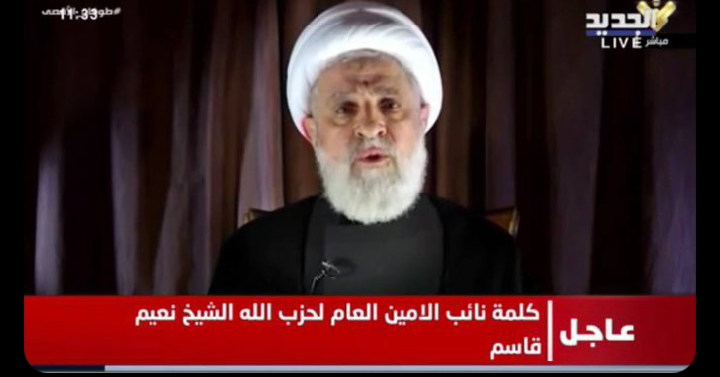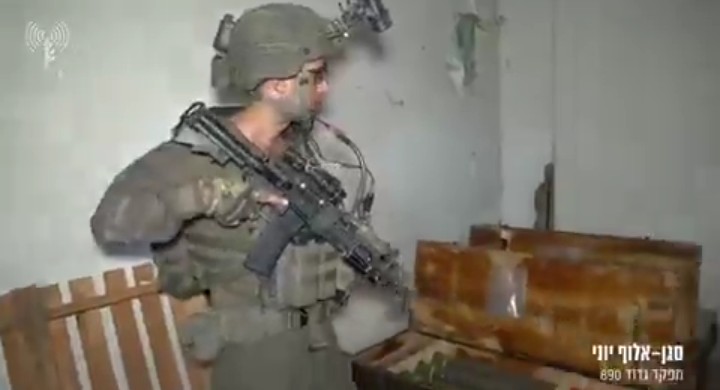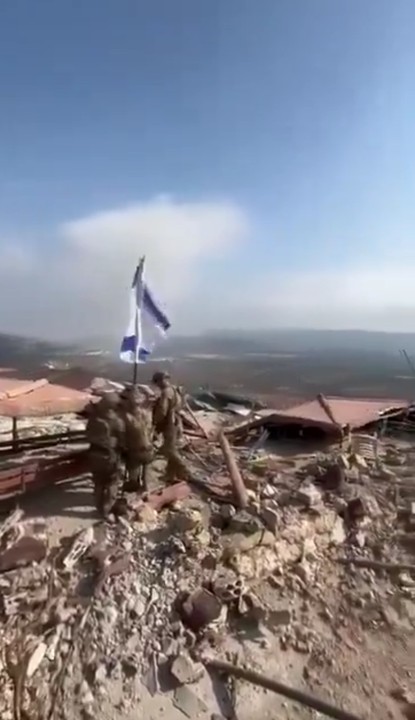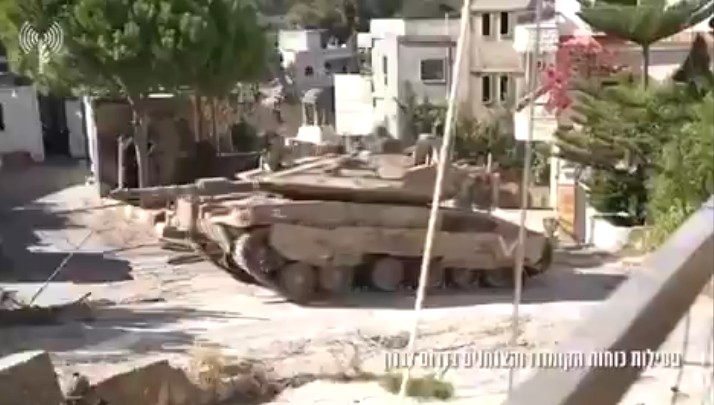Hezbollah on Tuesday declared its support for a ceasefire with Israel without tying it to a truce in Gaza for the first time, signalling a significant shift in the group’s stance after heavy setbacks.
In a speech from an undisclosed location, deputy leader Naim Qassem said the Iran-backed terrorist group was open to discussing postwar conditions in Lebanon once a ceasefire is established.
“We support political efforts … which work towards a ceasefire,” he said in his second speech since long-time Hezbollah leader Hassan Nasrallah was assassinated by Israel 11 days ago.
It is the first time Hezbollah has publicly said it supports a ceasefire without directly linking it to a similar agreement in Gaza.
Mr Qassem’s comments come as the US is reportedly moving away from pushing for a ceasefire agreement, with officials telling CNN the White House is looking to “shape” Israel’s invasion of Lebanon rather than halt it altogether.
Hezbollah, Iran’s main proxy group in the Middle East, has suffered severe blows in the past few weeks, from the assassination of its leadership to the explosion of booby-trapped pagers and walkie-talkies used by members to air strikes hitting its premises in Lebanon and Syria.
While the group attempts to rebuild, Israel has launched a ground invasion into south Lebanon in a bid to destroy Hezbollah’s military capabilities and infrastructure in the region, which the group has been building up since the 2006 war with Israel, including tunnels and rocket launchers.
Despite the killings of its commanders, Mr Qassem stressed that fighters loyal to the group were still able to fire missiles towards Israel, push against the ground invasion and even defeat the Israeli army. Israel’s military losses “could become a precursor for the end of the war”, he added. At least 10 Israeli soldiers have been killed in south Lebanon since the invasion started last week.
Hezbollah’s deputy leader Naim Qassem delivering a speech from an undisclosed location on Tuesday. Reuters
Mr Qassem insisted the assassinated commanders had already been replaced, saying the Hezbollah party, which has an influential political arm in Lebanon, would elect a new secretary general at the right time.
Hezbollah’s battle with Israel is about “who screams first”, he said. “We will not scream.”
About 60,000 Israelis have been displaced from the north since the conflict began a year ago. Israeli Prime Minister Benjamin Netanyahu says the aim of the conflict with Hezbollah, which the group started one year ago in support of its ally Hamas in Gaza, is to ensure the return of the residents to their homes.
“Netanyahu says he wants to return the settlers … but multiple times more will be displaced,” Mr Qassem said.
A western diplomat and Lebanese political sources told The National last week that Hezbollah had agreed to an internationally brokered ceasefire with Israel only a day before Mr Nasrallah was killed on September 27. Israel had initially agreed to the ceasefire but later “caught mediators off guard” by assassinating Nasrallah and intensifying its attacks on Lebanon, the sources said.
Before the negotiations, Hezbollah reaffirmed it would press on with its attacks as long as there is no ceasefire in Gaza, linking the fate of the Lebanese front to a truce in the Palestinian enclave. However, the diplomatic source said Israel’s announcement of a low-intensity phase in Gaza was meant to provide an opportunity for the Iran-backed group to agree to the proposed deal.
France, along with the US through its special envoy Amos Hochstein, led talks for border de-escalation throughout the year. These discussions involved the implementation of UN Resolution 1701, which ended the 2006 war between Israel and Hezbollah on both sides of the border.
The resolution called for Hezbollah to withdraw to the north of the Litani river, 30km from the border, and for the Lebanese Army to be stationed in the south, while Israel was to stop breaching Lebanon’s airspace. This was intended to pave the way for the demarcation of the disputed land border between the two countries.
“All details can be discussed and decided upon reaching a ceasefire,” Mr Qassem said, opening the door for negotiations regarding the day-after situation at the border region.
Shortly after his speech, the Israeli military said 85 projectiles had been launched from Lebanon towards Haifa, the largest barrage since the start of the war. The army did not say how many of the rockets were shot down, but Israeli media reported shrapnel and rockets falling in the city, causing damage. One person was injured, Israel’s ambulance service said.
The woman, in her 70s, was fully conscious after shrapnel hit her in the arm causing a “mild to moderate” injury, Israel’s ambulance service said. A further six people were injured while seeking shelter.
Haifa is one of Israel’s largest cities and home to infrastructure that Hezbollah has consistently said is in its sights. Video showed smoke streaming across the skies above the city as Israel’s vast air defence network engaged the projectiles. Smoke could then be seen rising from the city after a few rockets made it through.
The Lebanese group claimed responsibility for the attack, saying it was in response to the “barbaric Israeli violation” of Lebanese cities and villages. Around the same time, the Israeli military announced it had carried out strikes against Hezbollah in Beirut’s southern suburbs.
Earlier on Tuesday, the Israeli army claimed an air strike on Beirut had killed Sohil Hossein Hosseini, head of Hezbollah’s logistical headquarters, in Lebanon.
Mr Hosseini was a member of the group’s Jihad Council and oversaw weapons transfers from Iran, the army said on X. It claimed he was involved in managing “the most sensitive parts of the organisation”, including war plans. Hezbollah has yet to comment on the Israeli claims.
Israel’s announcement came as it continued attacking Lebanon overnight, striking across the south and Baalbek in the east. Dawn air strikes were reported in the southern district of Tyre and the Nabatiyeh village of Arabsalim. On Monday, the Israeli army issued an eviction order to residents to avoid the coastline south of the Awali river, north of Sidon, effectively cutting off the southern third of the country from the rest of Lebanon.
The Israeli army announced a fourth army division had been mobilised to join the ground invasion of Lebanon. The 146th Reserve Unit was sent to south-western Lebanon overnight, joining three divisions operating in central and eastern parts of the south. The 146th is the first group of combat reserves to join the invasion and has been deployed in Gaza and the occupied West Bank.
More than 2,000 people have been killed in Israeli attacks across Lebanon since cross-border fighting began on October 8 last year. At least 1,400 of them have been killed in the past three weeks as Israel intensified aerial attacks and launched a subsequent ground invasion.
Entire families have been killed in bombardments that have flattened residential buildings, while Israel has also killed several senior Hezbollah officials, most notably leader Hassan Nasrallah.
A year after Hezbollah attacked Israeli forces in support of Hamas, the UN and its peacekeeping mission in the country said in a joint statement that further violence and destruction will neither solve the underlying issues nor make anyone safer.
“Quite the opposite,” said Jeanine Hennis-Plasschaert, the UN’s Special Co-ordinator for Lebanon, and Gen Aroldo Lazaro, the head of peacekeeping force Unifil. “A negotiated solution is the only pathway to restore the security and stability that civilians on both sides so desperately want and deserve. The time to act accordingly is now.”
The Lebanese Armed Forces has insisted it will continue its duties despite recent Israeli attacks that led to the death of two soldiers. In a statement, the LAF said soldiers continued to be stationed across Lebanon, including in the areas that border Israel, have been subjected to intense shelling and remain in close co-ordination with Unifil.
While Lebanon and Israel are enemy states, the LAF and the state have stayed away from the clashes.
The developments came as diplomat Lolwah Al Khater, Qatar’s Minister of State for International Co-operation at the Ministry of Foreign Affairs, was due to arrive in Beirut on Tuesday.




Source- Thenationalnews
Now Playing: Love Bug
Aretti Adi
SPONSORED LINKS
LOAN FOR TRAVEL, VISA, JAPA, PoF UP TO N200M (CLICK HERE)
[CLICK HERE] For Music Artwork, Website Design And SEO Setup
INSTALL 9JAFLAVER MUSIC APP, STREAM, DOWNLOAD, AND PLAY MUSIC OFFLINE
CHECK OUT FUNNY PICTURE AND MEME HERE (CLICK HERE)
Chissom Anthony – Glory To God In The Highest [See Trending Gospel Song]
Copyright © 2014-2026 9jaflaver. All Rights Reserved.
About us | DMCA | Privacy Policy | Contact us
| Advertise| Request For Music | Terms Of Service
9jaflaver is not responsible for the content of external sites.